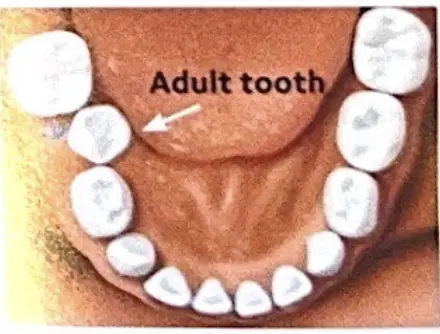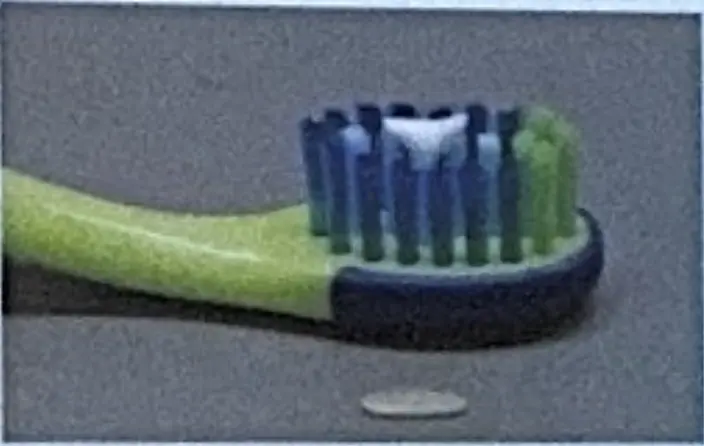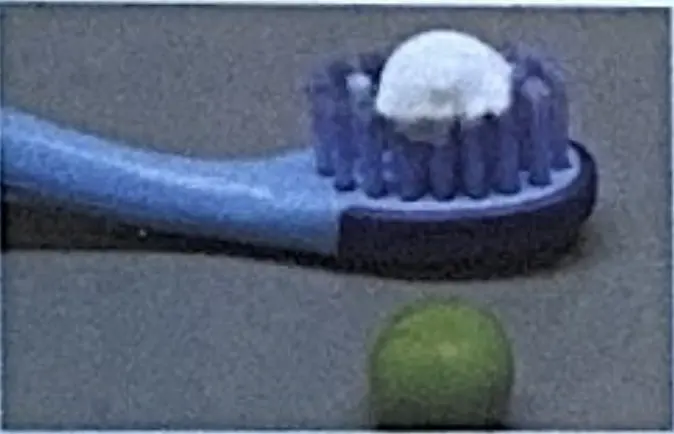Baby teeth can get cavities!
Your child’s first tooth is exciting. It’s the start of a lifetime of smiling! But, baby teeth have more jobs than just making a beautiful smile. Baby teeth help with eating learning to talk and making sure there is room for permanent teeth to come in. For these reasons it’s important to keep baby teeth healthy and avoid tooth decay.
Tooth Decay Is Caused by Bacteria
Tooth decay damages and breaks down teeth. When your Child eats and drinks, bacteria in their mouth feed on the sugars that are found in foods and drinks. The bacteria create acids that can break down the hard, outer layer of their teeth, called enamel (e-NAM-uhl). Over time, tooth decay car develop and a hole, or cavity. may form in the tooth.
Tooth Decay Can Affect Your Baby’s Overall Health
Tooth decay can start as soon as your baby’s teeth come in, usually by age 6 months. This Can cause pain, which can make it difficult fory your baby to talk and eat. Eating problems can cause poor nutrition which may affect growth and development.
Tooth decay is an infection that can spread to other parts of the tooth and, in severe cases, the body 4 toothache, swelling of the cheek, fever or trouble breathing all may indicate that the infection from tooth decay is spreading.
Untreated tooth decay causes brown or even black spots on the teeth. This can cause your child to be embarrassed about his or her smile.
Baby Teeth Are Important
Baby teeth hold space for the adult teeth. Tooth decay can cause baby teeth to fall out too early. If baby tooth is lost too early, the teeth beside it may drift or move into the empty space. When it’s time for the adult teeth to come in, there may not be enough room for them. This may cause a dult teeth to be crowded and crooked. Crowded and crooked teeth not only affect your child’s smile, they also may be harder to keep clean.
Baby teeth help when eating. When your baby starts eating solid food, he or she will need teeth for biting and chewing
Baby teeth help when learning to talk. The front teeth especially are important in helping your child make certain sounds, like “s,” f,” and “th”. When baby teeth are lost too early, it may be difficult for your child learn to speak clearly.

If a baby tooth is lost too early, the teeth beside it may drift into the empty space.
How to keep your Child’s Teeth Healthy at Every Stage
Chidren learn healthy habits from their parents and caregivers. You can start good habits by brushing your child’s teeth every day, feeding your child a healthy diet and taking them to the dentist on a regular bass, beginning at age 1.
Before any baby teeth come in
• Wipe your baby’s gums with a clean, wet gauze pad or washcloth after each feeding and before they go to sleep. This removes bits of food that can harm teeth that are starting to come in. It also helps your child get used to having their mouth cleaned.
When your child’s first tooth comes in (around 6 months old)
• Brush your baby’s teeth two times every day (morning and night).
• Use a child-sized toothbrush with soft bristles and a grain-of-rice sized amount of toothpaste that has fluoride (FLOOR-eyed). Fluoride is a mineral that helps keep the outer layer of teeth strong. This can help lower the risk of tooth decay.
• Do not allow your baby to fall asleep while breastfeeding.
• Infants should not be put to bed or allowed to fall asleep with a bottle that contains milk, formula, fruit juice, or any liquids with sugar. Even watered-down drinks can damage teeth.
• If your child uses a pacifier, do not dip it in sugar or honey. Do not put it in your mouth before giving it to your child. Decay-causing bacteria in your mouth can be passed to your baby.
• A bottle should not be used as a pacifier. Sipping sugary liquids during the day can also cause tooth decay.
When your child’s second, third and more teeth come in (around 8 months old)
• Try to get your child to drink from a cup by their first birthday. Training cups should be used for only a short time.
• Once your child has learned how to sip, training cups should no longer be used.
• Don’t let your baby constantly sip on liquids with sugar (including juice). If they are thirsty between snacks or meals, offer water.
• Brush your child’s teeth two times a day, for two minutes each time. Clean between their teeth as soon as they have two teeth next to each other.
Use the right amount of toothpaste for your child


• Brush your child’s teeth until they are able to brush on their own, usually between ages 6 and 9. When your child starts brushing their own teeth, watch to make sure they are brushing for two minutes and are not “rushing the brushing. Teach your child to spit out the toothpaste and not to swallow it.
When Your Child Can Brush on Their Own
• Make brushing a twice-a-day routine. You may be tempted to skip brushing after a long day or when your normal schedule is off. But, you can make brushing second nature for your child by doing it twice every day for two minutes.
• Reward good brushing behavior. You can encourage your child with rewards that motivate them whether it’s letting them earn stickers for a reward chart or giving them a big high five.
• Let your child pick their toothbrush. Take them shopping and let them choose a toothbrush with their favorite character and toothpaste with the ADA Seal of Acceptance and a special flavor.
Healthy baby teeth lead to healthy adult teeth. Children who have decay in their baby teeth are more likely to have decay in their adult teeth. Help your child learn to care for their teeth as soon as they start coming in.